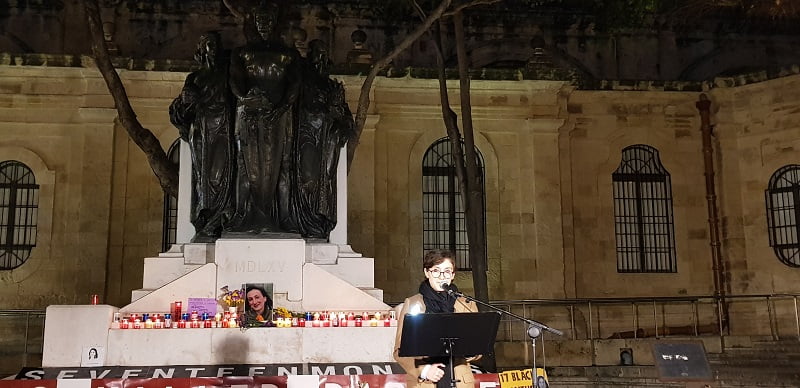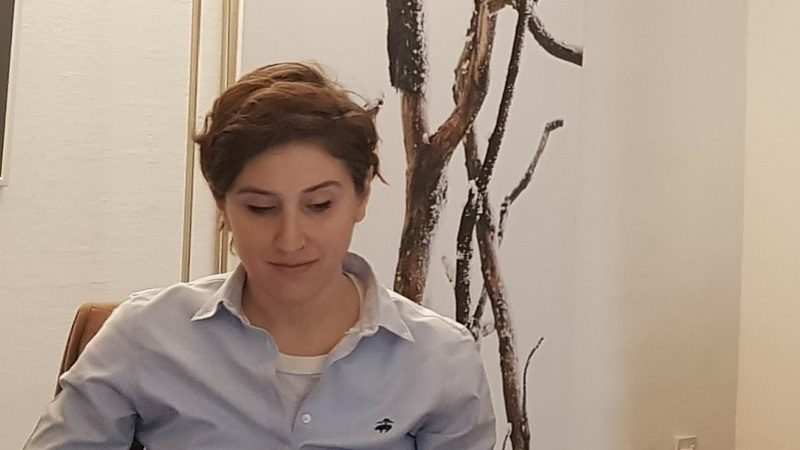In the absence of government action, it is up to civil society and journalists to collaborate across borders and to support each other in the pursuance of the truth.
This, along with the statement that without media freedom there can be no democracy, were two of the key messages presented at today’s debate on press freedom in Malta.
The event was organised to coincide with the 17 month anniversary of the assassination of investigative journalist Daphne Caruana Galizia. A vigil at the protest memorial in front of the law courts in Valletta followed.
Organised by PN Head of Delegation David Casa, and attended by Turkish journalist Pelin Ünker, academic and columnist Ranier Fsadni and academic Gorg Mallia, among others the panel debated impunity and the issue of declining freedom of expression, restricted media freedom and the lack of freedom of information.
These points were discussed in the context of their impact in Turkey and Malta, as well as the part they play in a bigger, global problem.
Those on the panel called for anti-SLAPP laws to be implemented at a national level as well as the European Commission to adopt legislative measures to protect journalists across the union and beyond.
Read: Russian banker threatens The Shift News with SLAPP lawsuit
Casa noted that the Commission had to ensure that the rule of law and uncompromised judiciaries were present in all Member States. He added that it shouldn’t take the murder of a journalist for those speaking up against corruption and problems with the rule of law to be taken seriously.
Casa said that politicians and public officials need to “change their mentality” and learn to respect the role of a journalist while respecting that the media is there to hold these people accountable for their actions.
He added that those who criticise the situation in Malta are not criticising the country itself, but rather those who are running it: “When MEPs raise the problem at EU level, it is not a criticism of Malta, it is a criticism of the government. Joseph Muscat is not Malta.”
Ünker described the situation in Turkey as “rapidly deteriorating” and accused the regime of not just putting countless journalists behind bars, but of hindering freedom of access and the right to information.

Pelin Ünker speaking at the vigil for Daphne Caruana Galizia 17 months since her assassination.
She expressed her solidarity with Maltese journalists and drew parallels between the situation in the two countries. Calling for justice for Caruana Galizia, she also called for better cross-border collaboration between journalists reporting on government corruption, to ensure that the dissemination of important information is more powerful and far-reaching.
Caroline Muscat said that due to an increase in threats from beyond national borders, journalists, and the authorities, needed to take a international approach to protection. The fact that most of the media in Malta was owned by political parties remained a problem for a free and independent press necessary in a democracy, she added.
Ünker is currently facing 13 months imprisonment in Turkey for reporting on facts from the Paradise Papers leaks regarding the former Prime Minister Binali Yildirim, his two sons, and a total of five offshore companies in Malta.
Despite these facts not being disputed by her accusers, she was found guilty of defamation in January and described her sentence as a “simple scare tactic designed to intimidate her”.
While she was given a visa for her short visit to Malta where she will also be addressing the monthly vigil organised by Repubblika, Occupy Justice and Manuel Delia at the Great Siege Square in Valletta, her infant son and her husband were refused entry.
She closed her statement by saying that the abuse and degradation of Caruana Galizia did not stop with her death and that, as journalists “we must not allow ourselves to be silenced,” especially when writing the truth is what poses the biggest risk.












